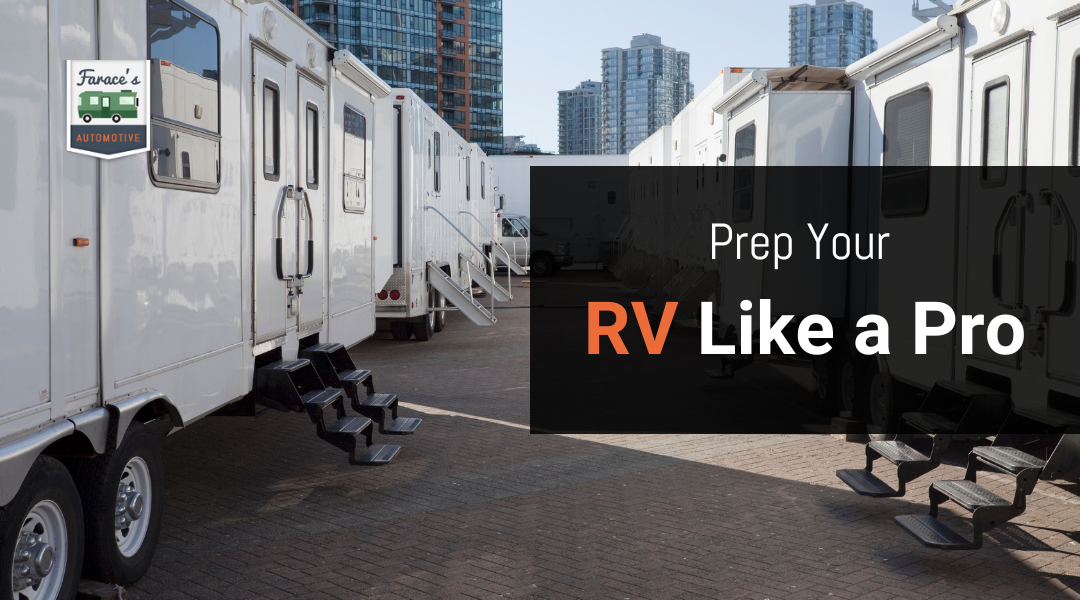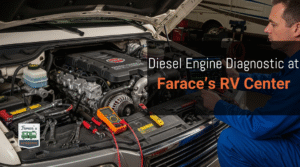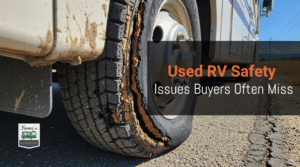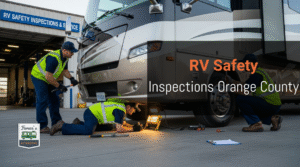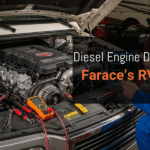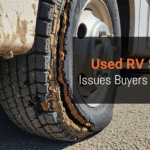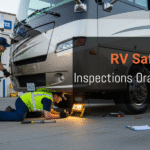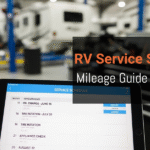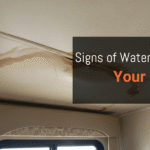Preparing your RV for each season is essential for enjoying your adventures to the fullest. Proper seasonal maintenance can help prevent costly repairs and ensure your vehicle runs smoothly. At Farace Automotive & R.V. Center, we understand that a well-maintained RV is key to a worry-free journey, no matter where the road takes you.
Keeping up with seasonal maintenance tasks, like checking your tires, inspecting the roof, and ensuring your generator is functioning, will greatly enhance your experience. Regular inspections can spot potential problems before they become serious issues. With over 40 years of experience in RV care, our team is ready to guide you through each of these important steps.
As you gear up for your next adventure, knowing what to check and maintain can make all the difference. From mechanical repairs to interior remodeling, Farace’s Automotive & R.V. Center is here to help you get your RV in top shape. Trust our expertise to keep your journeys safe and enjoyable.
Why Seasonal RV Maintenance Is Essential
Regular seasonal maintenance is crucial to keep your RV in great shape. It allows you to enjoy worry-free adventures while protecting your investment. Neglecting this important task can lead to serious issues down the road.
Protecting Your Investment Long-Term
Your RV is a significant investment that deserves proper care. Regular maintenance helps ensure that all systems—like plumbing, electrical, and HVAC—work effectively.
- Check Fluids: Regularly inspect and replace essential fluids, including oil and coolant, to prevent engine and system damage.
- Inspect Tires: Tires should be checked for wear and proper inflation. This keeps you safe on the road and prolongs tire life.
- Clean and Seal: Keeping seals and roofs clean prevents leaks and mold, protecting your RV’s structure.
Taking these steps helps maintain your RV’s value and ensures it operates optimally for years.
Avoiding Costly Repairs And Downtime
Seasonal maintenance can help you avoid expensive repairs that could arise from neglect. Small issues addressed early can save you significant time and money later.
- Regular Inspections: Identify and fix minor issues before they become major problems. This could include replacing worn brake pads or fixing leaks.
- Test Electronics and Appliances: Ensure all electronic components and appliances work fine. Faulty wiring or broken devices can lead to more significant damage if ignored.
- Routine Cleaning: Keeping your RV clean, inside and out, also protects against deterioration and helps maintain resale value.
By taking proactive steps, you can prevent downtime and ensure a smooth, enjoyable trip every time you hit the road.
Spring RV Maintenance: Pre-Travel Prep
Preparing your RV for spring travel is essential. Proper maintenance will help ensure a smooth adventure. Focus on inspecting the exterior, checking fluids, and monitoring tire conditions. These steps will keep your RV safe and ready for any road trip.
Exterior Inspection: Roof, Seals & Paint
Start your spring prep with a thorough exterior inspection. Check your RV’s roof for any signs of damage, such as cracks or leaks. A leaky roof can lead to costly repairs later. Clean off any debris and make sure all vents and seals are intact.
Next, examine the seals around windows and doors. If you find cracks or breaks, consider resealing them to prevent leaks.
Don’t forget to inspect the paintwork. Look for chips or faded areas that might need touch-ups. Keeping the exterior in good shape helps protect against the elements and extends the life of your RV.
Fluid Checks: Oil, Coolant & Brake Systems
Next, it’s time to check your RV’s fluids. Start with the engine oil. Check the level and ensure it’s clean. If it’s dark or gritty, it’s time for an oil change. Regular oil changes keep your engine running smoothly.
Next, inspect the coolant level. Adequate coolant is vital for engine performance, especially during warm weather. If the level is low, top it up with the correct coolant type.
Lastly, don’t forget the brake system. Ensure that brake fluid is at the proper level and check for any signs of leaks. Proper fluid levels help ensure your RV stops safely, providing peace of mind on the road.
Tire Pressure & Wheel Bearing Maintenance
Tire care is crucial. Start by checking tire pressure. Use a tire gauge for accurate readings. Keep your tires inflated to the manufacturer’s recommended pressure to enhance fuel efficiency and road safety.
Examine your tires for uneven wear or cracks. If you see any issues, consider rotating or replacing the tires as needed.
Finally, inspect the wheel bearings. A lack of lubrication can lead to serious issues. If you’re unsure, have a professional check the bearings for wear or damage. Properly maintained wheels ensure safe handling and performance on the road.
Summer RV Care: Keeping Cool & Functional
As the temperatures rise during summer, your RV requires special attention to ensure it stays cool and operational. Proper maintenance of key systems can enhance your comfort and prevent breakdowns during your adventures.
HVAC System & Ventilation Checks
Start with your HVAC system. Check the air conditioning filters and replace them if they are dirty. Clogged filters can reduce airflow and cooling efficiency. Inspect the AC unit for any debris, and clean the exterior coils.
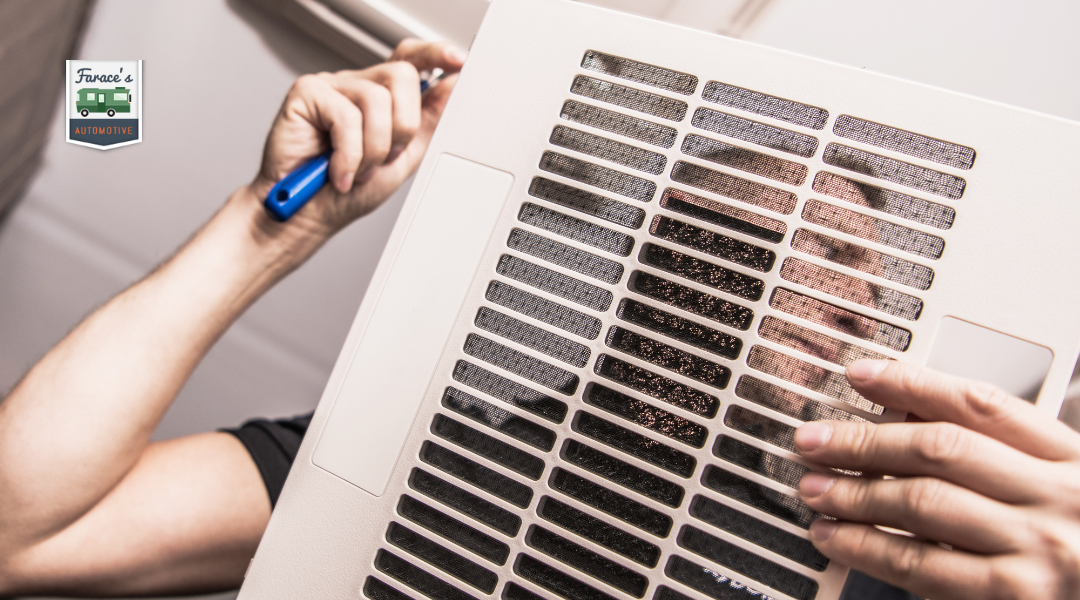
Next, ensure that all vents are unobstructed for optimal airflow. Pay attention to ductwork for any signs of wear or leaks. Sealing any leaks can help keep the cold air inside your RV.
Also, consider a roof vent cover to improve ventilation when you are parked. This allows for airflow even during rain, reducing the chance of moisture buildup.
Propane & Generator Performance
Your propane system needs evaluation before hitting the road. Check all connections for leaks, using soapy water to reveal any bubbles. Replace any faulty hoses to ensure safety.
Inspect your generator; make sure it’s properly fueled and in good working condition. Run it for a short time to check for any unusual noises or performance issues.
Regularly check the oil and air filter in the generator to ensure it runs smoothly during your travels. Keeping your propane and generator systems in top condition is crucial for powering appliances and appliances during your adventures.
Pest Prevention Tips
Summer months bring pests that can invade your RV. Start by sealing all potential entry points, including windows, doors, and vents. Use weather stripping to close any gaps.
Consider using screens on windows and roof vents to keep insects out while allowing for ventilation. Make it a habit to keep food stored in airtight containers.
Regularly check under appliances and in storage areas for signs of pests. Setting traps and keeping the RV clean can help prevent infestations. These steps will help ensure your RV remains a comfortable and enjoyable space during summer trips.
Fall Maintenance: Preparing For Cooler Weather
As temperatures drop, it’s essential to prepare your RV for the changing weather. Taking specific steps now can prevent damage and ensure a smooth transition into the colder months. Focus on protecting your water system, checking the battery and electrical components, and safeguarding the exterior.
Water System Winterization Basics
To prevent your water system from freezing, winterization is crucial. Start by draining your fresh water tank and water lines.
- Drain all faucets and fixtures: Open all hot and cold faucets, and ensure any remaining water is removed.
- Add antifreeze: Use non-toxic RV antifreeze. Pour it into your system via the water pump, making sure it reaches all faucets and the toilet.
- Check appliances: Don’t forget to run antifreeze through the ice maker and dishwasher if applicable.
This process protects your plumbing and ensures every part of your water system remains functional when spring arrives.
Battery Storage & Electrical Checks
Take time to evaluate your RV’s battery and electrical system. Cold temperatures can reduce battery life and performance.
- Inspect battery condition: Look for corrosion on terminals. Clean as needed and ensure connections are tight.
- Charge fully: Store batteries in a fully charged state to prevent damage. Consider a trickle charger to maintain optimal voltage.
- Test electrical systems: Turn on lights and appliances to identify any issues. Make any necessary repairs now to avoid problems on your trips.
Taking these steps will enhance the reliability of your RV’s electrical system throughout the winter.
Exterior Protection Before Winter
Your RV’s exterior is exposed to the elements, making protective measures important.
- Seal any leaks: Inspect seals around windows, doors, and roofs for cracks. Use caulk or sealant to fix any issues and prevent water intrusion.
- Wash and wax: Clean the exterior thoroughly, removing dirt and grime. Apply a waxing product to protect the paint and finish.
- Cover your RV: If possible, use an RV cover or tarps to shield it from snow and ice. Ensure ventilation to avoid moisture buildup under covers.
These steps will help your RV withstand winter weather and keep it ready for your adventures ahead.
Winter RV Maintenance: Storage & Protection
Preparing your RV for winter storage is essential to protect it from damage. Proper storage techniques and maintenance can extend the life of your vehicle while ensuring it’s ready for your next adventure.
Proper Indoor Vs. Outdoor Storage Tips
Choosing the right storage location is crucial. Indoor storage offers the best protection from the elements. It shields your RV from harsh weather, snow, and ice. Look for facilities that have a climate-controlled environment.
If indoor storage isn’t an option, outdoor storage is still viable. Opt for a high-quality RV cover designed for winter conditions. Make sure it’s breathable to reduce moisture buildup. Secure the cover properly to prevent wind damage.
Key Tips for Outdoor Storage:
- Place blocks under the tires to prevent moisture.
- Use tire covers to protect from UV rays.
- Regularly check the condition of the cover.
Moisture Control & Ventilation
Moisture can cause serious problems during winter. To combat this, ensure your RV is dry before storing. Clean all surfaces and remove any perishable items.
Use desiccants or moisture absorbers inside the RV to keep the air dry. Additionally, it’s vital to maintain airflow. Open cabinets and closet doors to allow air circulation.
Avoid sealing your RV tightly. Ventilation prevents mold growth and helps to protect fabrics and surfaces.
Engine & Fuel System Preservation
Taking care of your engine and fuel system is vital during the winter months. Start by filling the fuel tank to reduce condensation. Adding a fuel stabilizer can prevent fuel from degrading.
Change your oil and filter before storage. Old oil contains contaminants that can harm the engine if left unused. Also, ensure the battery is fully charged and disconnected if possible.
Consider running the engine for a few minutes every few weeks to keep parts lubricated. This practice helps in maintaining the overall health of your engine over the winter.
Seasonal Deep Cleaning & Interior Care
Maintaining your RV’s interior is essential for comfort and longevity. Regular deep cleaning ensures that your vehicle stays fresh and ready for each adventure. Here are key areas to focus on for seasonal care.
Upholstery & Flooring Maintenance
Start by vacuuming all upholstery to remove dirt and debris. Pay special attention to crevices where crumbs and dust settle. For fabric upholstery, consider using a fabric cleaner that’s safe for RV materials. Spot clean stains promptly to prevent them from embedding.
For hard surfaces, use a mild cleaner that won’t damage your materials. Mop the floors with a suitable cleaning solution. Focus on areas that experience high foot traffic, such as entryways and kitchen spaces, to prevent wear. Rotate or reposition furniture if possible to even out wear and tear on carpets and linoleum.
Fridge & Appliance Care
Keep your fridge and appliances in good shape by following these steps. First, unplug the fridge and remove all contents. Clean surfaces with a mix of water and baking soda to eliminate odors. Don’t forget to check the seals; replace them if you notice any wear.
For ovens and stovetops, use non-toxic cleaners specifically designed for RV use. Clean spills immediately to avoid tough stains. Make sure to run your appliances on a regular basis, even when not in use, to keep them functioning smoothly.
Odor Prevention Strategies
To keep your RV smelling fresh, begin by ensuring proper ventilation. Open windows and use fans to promote air circulation, especially during cleaning. Consider using natural odor absorbers like baking soda or activated charcoal in storage areas.
Check and clean the bathroom frequently to prevent musty odors. Store food in airtight containers and clean up spills promptly. You might also use essential oils or air fresheners designed for RVs to create a pleasant environment. Remember to regularly check under furniture and appliances, as hidden areas can accumulate odors.
When To Call Farace Automotive & R.V. Center
Understanding when to seek professional help is important for your RV’s health. Knowing the signs that indicate you need service can prevent larger issues down the line. Here you’ll find specific reasons to reach out to Farace Automotive & R.V. Center.
Signs You Need Professional Service
If you notice any of the following signs, it’s time to contact your local RV repair service. Common indicators include:
- Strange Noises: Unusual sounds from the engine or brakes may indicate serious issues.
- Fluid Leaks: Any fluid pooling beneath your RV can suggest a problem that needs attention.
- Electrical Failures: Flickering lights or non-functioning outlets can be a sign of electrical issues.
- Tire Problems: Uneven wear or low pressure needs immediate inspection to avoid accidents.
- Check Engine Light: If this warning light comes on, don’t ignore it; it often means you need diagnostics.
Recognizing these symptoms early can save you money and ensure a safer drive.
Our Seasonal Maintenance Packages
At Farace Automotive & R.V. Center, you can choose from several seasonal maintenance packages designed for RVs. Each package includes:
- Comprehensive Inspections: Our team checks essential systems like brakes, tires, and lights.
- Fluid Changes: Regular oil and coolant changes increase your RV’s longevity.
- Electrical System Checks: We ensure everything is working, from the battery to the outlets.
- Exterior Condition Assessments: Inspecting seals and the roof prevents water damage.
- Tire Maintenance: Rotation and pressure checks keep your RV safe on the road.
These services help you prepare your RV for all types of weather and conditions, especially in areas like Huntington Beach where climate changes can be significant.
Customer Success Stories
Many RV owners have benefited from our expert services. Testimonials often highlight:
- Quick Repairs: Customers appreciate our fast response times for emergency repairs.
- Quality Service: Many have reported being impressed with the thoroughness of our inspections and maintenance.
- Trust and Reliability: Long-term relationships with customers have built a strong reputation in the community.
- Improved Performance: After our seasonal packages, RV owners frequently note enhanced drivability and fewer issues.
Seeing the satisfaction of our clients reinforces the commitment to quality service at Farace Automotive & R.V. Center.
Essential Tools & Supplies For DIY Maintenance
When maintaining your RV, having the right tools and supplies is crucial. This section covers essential maintenance kits, effective cleaning products, and important safety gear to ensure your DIY projects go smoothly.
Must-Have RV Maintenance Kits
Keeping a well-stocked maintenance kit is essential for any RV owner. Here are some key items to include:
- Basic Toolbox: This should contain screwdrivers, pliers, wrenches, and a hammer.
- Ratchet Set: Useful for tightening bolts and screws on various parts of your RV.
- Duct Tape and Electrical Tape: Handy for quick fixes on hoses or wiring.
- Plumber’s Tape: Use it for sealing plumbing connections to prevent leaks.
- Zip Ties: These can be great for securing loose wires or other items that might rattle during travel.
Having these tools on hand allows you to tackle minor repairs and maintenance tasks without delay.
Recommended Cleaning Products
Keeping your RV clean is just as important as repairs. Here’s a list of recommended cleaning products:
- Mild Detergent: Ideal for washing the exterior without damaging the paint.
- Glass Cleaner: Keeps your windows clear and streak-free for better visibility.
- All-Purpose Cleaner: Useful for various surfaces, tackling grime and dirt inside and outside.
- Vinegar: A natural option for cleaning and deodorizing; it works wonders on surfaces.
- Protectant Spray: Helps maintain your RV’s exterior surface and prevents fading from UV rays.
Using the right cleaning products helps prolong the life of your RV’s surfaces and keeps it looking great.
Safety Gear For DIYers
Safety should be your priority whenever you’re doing maintenance on your RV. Essential safety gear includes:
- Gloves: Protect your hands from sharp edges and harsh chemicals.
- Safety Goggles: Prevent eye injuries when sanding or using cleaning chemicals.
- Dust Mask: Important for protecting your lungs from dust and fumes, especially when working with materials like fiberglass.
- First Aid Kit: Always have a basic first aid kit available for minor injuries.
With the right safety gear, you can work confidently and minimize the risk of injury during your DIY maintenance tasks.

